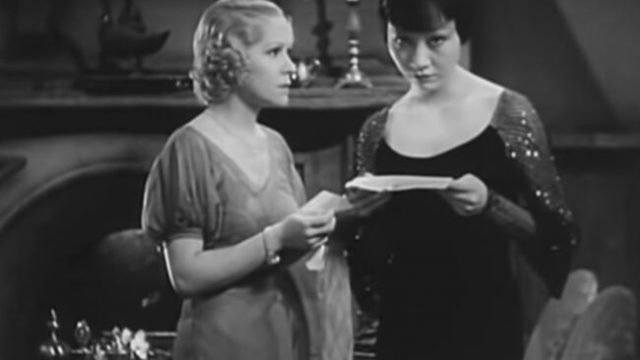I do a certain amount of shifting of the Celebrating the Living list, depending on when people are brought to my attention. Several people have been moved down the list—I’m pretty sure one has been moved down the list at least twice—because other people have come up who are either very old indeed or in very poor health. So I’m trying to get to them before they fall into the five-year gap of not being eligible for either column. Obviously, this is not a situation that happens for this column. I once moved someone because I was too depressed to do the thinking involved to get five paragraphs about her (for some people, it’s easier than others); I moved Anna May Wong to give me time to actually watch a few of her movies, which I’m not sure I’d ever done.
You don’t have to, to be familiar with at least the idea of her. She was a third-generation American, but she was still of Chinese descent, and she’s as famous for being one of the few PoC celebrities of the early Hollywood era as she is for her acting. More so; few of her movies have had any kind of quality release in the studio era. They’re accessible—well, a lot of them are in the public domain these days, regardless of what happened with them in the ’50s—but it’s more a matter of happening upon them than having them celebrated.
Honestly, I suspect no few of them aren’t very good to begin with. I am fascinated by the version of A Study in Scarlet she appeared in. You may find yourself wondering where a Chinese character fits into the anti-Mormon mystery at the heart of that story. The answer is that she doesn’t; the filmmakers were willing to pay to license the name, and the characters of Holmes and Watson, but not the actual plot of A Study in Scarlet, which would have cost more. So they made up a completely different Holmes story, wherein Wong plays the mysterious widow of a member of a shadowy secret society; she is revealed at the end to have actually been a mistress, not a wife, I believe. Honestly, the plot doesn’t make a ton of sense.
Still, it’s quite obvious that it’s a pre-Code film because Wong was allowed to have explicitly had a relationship with an Englishman. This was one of several things sabotaging Wong’s career; though she only made one movie with Sessue Hayakawa, there quickly came a time when she wasn’t allowed to have relationships with white characters. And even when she could, she was being paid less than her white costars even when she had more screentime and was more of a draw. She knew it—how could she not—and she became an advocate for minority actors.
I’m frankly surprised that there hasn’t been a resurgence of interest in her. I only got around to a few of her movies—she’s the noble Chinese nationalist in Lady From Chungking who sacrifices herself to help an American pilot downed by the villainous Japanese, for example—but it’s clear that she was one of those actresses who was capable of rising above some really dreadful material. A lot of focus in her lifetime was on how beautiful she was, and goodness knows she was beautiful, but it’s sad to me that we still aren’t talking much about how talented she was. Because she was definitely that as well.
I wasn’t able to afford her only appearance in the Criterion Collection, the six-movie box set featuring The Lady From Shanghai; help sponsor my research by supporting my Patreon or Ko-fi!

